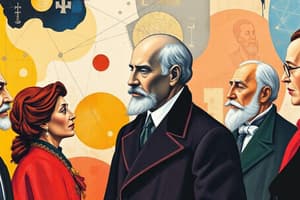Podcast
Questions and Answers
Which of the following best describes the primary focus of functionalism in early psychology?
Which of the following best describes the primary focus of functionalism in early psychology?
- Exploring the unconscious drives and conflicts that influence behavior.
- Analyzing the basic elements of consciousness through introspection.
- Examining observable behaviors and their relationship to environmental stimuli.
- Understanding the purpose of consciousness and behavior in adapting to the environment. (correct)
A researcher is interested in studying the impact of different teaching methods on student test performance. According to the principles of behaviorism, which approach would they most likely use?
A researcher is interested in studying the impact of different teaching methods on student test performance. According to the principles of behaviorism, which approach would they most likely use?
- Investigating how students' early childhood experiences affect their learning styles.
- Monitoring and comparing the observable behaviors and test scores of students under different teaching methods. (correct)
- Conducting in-depth interviews to understand students' thought processes during learning.
- Analyzing students' unconscious motivations for academic achievement.
Wilhelm Wundt's establishment of the first psychology laboratory in 1879 is significant because it:
Wilhelm Wundt's establishment of the first psychology laboratory in 1879 is significant because it:
- shifted the focus of psychology from behavior to mental processes.
- introduced the concept of functionalism and its emphasis on adaptation.
- formalized psychology as a scientific discipline with empirical methods. (correct)
- marked the beginning of psychoanalysis and the study of the unconscious mind.
How did the behaviorist perspective of psychology differ from the psychoanalytic perspective?
How did the behaviorist perspective of psychology differ from the psychoanalytic perspective?
Which approach would Sigmund Freud most likely use to explain a patient's anxiety?
Which approach would Sigmund Freud most likely use to explain a patient's anxiety?
Which psychological perspective is most directly concerned with assessing the relative contributions of our genes and our environment on our individual differences?
Which psychological perspective is most directly concerned with assessing the relative contributions of our genes and our environment on our individual differences?
A researcher is interested in studying the long-term effects of childhood trauma on adult mental health. Which subfield of psychology is most relevant to this research?
A researcher is interested in studying the long-term effects of childhood trauma on adult mental health. Which subfield of psychology is most relevant to this research?
A company wants to improve employee job satisfaction and productivity. Which subfield of psychology would be most helpful in achieving this goal?
A company wants to improve employee job satisfaction and productivity. Which subfield of psychology would be most helpful in achieving this goal?
In an experiment studying the effects of sleep deprivation on cognitive performance, what would be the independent variable?
In an experiment studying the effects of sleep deprivation on cognitive performance, what would be the independent variable?
A researcher wants to determine if watching violent TV shows causes children to act more aggressively. Which research method would be most suitable for establishing a cause-and-effect relationship?
A researcher wants to determine if watching violent TV shows causes children to act more aggressively. Which research method would be most suitable for establishing a cause-and-effect relationship?
What is the critical difference between sensation and perception?
What is the critical difference between sensation and perception?
Which of the following scenarios best illustrates classical conditioning?
Which of the following scenarios best illustrates classical conditioning?
What is the primary difference between operant and classical conditioning?
What is the primary difference between operant and classical conditioning?
Which of the following is an example of episodic memory?
Which of the following is an example of episodic memory?
Which component is NOT a typical element of emotion?
Which component is NOT a typical element of emotion?
Which of the following distinguishes a psychological disorder from a normal psychological state?
Which of the following distinguishes a psychological disorder from a normal psychological state?
Which type of therapy is most likely to focus on exploring a client's past experiences and unconscious conflicts?
Which type of therapy is most likely to focus on exploring a client's past experiences and unconscious conflicts?
What is the key difference between prejudice and discrimination?
What is the key difference between prejudice and discrimination?
According to Piaget's theory of cognitive development, in which stage do children begin to think logically about concrete events?
According to Piaget's theory of cognitive development, in which stage do children begin to think logically about concrete events?
Which part of the neuron is responsible for transmitting signals to other neurons?
Which part of the neuron is responsible for transmitting signals to other neurons?
Flashcards
What is Psychology?
What is Psychology?
The scientific study of the mind and behavior.
Who is Wilhelm Wundt?
Who is Wilhelm Wundt?
Established the first psychology laboratory in 1879.
What is Functionalism?
What is Functionalism?
Focused on the purpose of consciousness and behavior in adapting to the environment.
Who is Sigmund Freud?
Who is Sigmund Freud?
Signup and view all the flashcards
Who is John B. Watson?
Who is John B. Watson?
Signup and view all the flashcards
Neuroscience Perspective
Neuroscience Perspective
Signup and view all the flashcards
Evolutionary Perspective
Evolutionary Perspective
Signup and view all the flashcards
Behavioral Perspective
Behavioral Perspective
Signup and view all the flashcards
Cognition
Cognition
Signup and view all the flashcards
Counseling Psychology
Counseling Psychology
Signup and view all the flashcards
Developmental Psychology
Developmental Psychology
Signup and view all the flashcards
Correlational Research
Correlational Research
Signup and view all the flashcards
Independent Variable
Independent Variable
Signup and view all the flashcards
Classical Conditioning
Classical Conditioning
Signup and view all the flashcards
Operant Conditioning
Operant Conditioning
Signup and view all the flashcards
Motivation
Motivation
Signup and view all the flashcards
Psychological Disorders
Psychological Disorders
Signup and view all the flashcards
Conformity
Conformity
Signup and view all the flashcards
Nature vs. Nurture
Nature vs. Nurture
Signup and view all the flashcards
Neurotransmitters
Neurotransmitters
Signup and view all the flashcards
Study Notes
Okay, I have updated the study notes to reflect the information provided in the text. All information is factually accurate and the structure is preserved.
- Psychology is the scientific study of the mind and behavior
- It encompasses a wide range of subfields and theoretical perspectives
- Psychology uses empirical methods to investigate mental processes and behavior
History and Key Figures
- Wilhelm Wundt is credited with establishing the first psychology laboratory in 1879 in Leipzig, Germany, marking the formal beginning of psychology as a science
- William James, an American philosopher and psychologist, was a key figure in the development of functionalism
- Functionalism focused on the purpose of consciousness and behavior in adapting to the environment
- Sigmund Freud developed psychoanalysis, a theory emphasizing the role of the unconscious in shaping behavior
- John B. Watson championed behaviorism, which focuses on observable behavior rather than mental processes
- B.F. Skinner further developed behaviorism and introduced the concept of reinforcement
Major Perspectives in Psychology
- Neuroscience perspective explores the relationship between the brain, nervous system, and psychological processes
- Evolutionary perspective examines behavior and mental processes in terms of their adaptive value
- Behavior Genetics perspective studies the influence of genes and environment on individual differences
- Psychodynamic perspective, rooted in Freud's work, emphasizes unconscious drives and conflicts
- Behavioral perspective focuses on how behavior is learned through conditioning and observation
- Cognitive perspective studies mental processes such as memory, problem-solving, and decision-making
- Social-Cultural perspective examines how behavior and thinking vary across situations and cultures
Subfields of Psychology
- Clinical psychology focuses on the assessment, diagnosis, and treatment of mental disorders
- Counseling psychology helps people cope with challenges and crises and to improve their personal and social functioning
- Developmental psychology studies physical, cognitive, and social change throughout the lifespan
- Educational psychology studies how people learn and the effectiveness of teaching techniques
- Industrial-Organizational (I/O) psychology applies psychological principles to the workplace to improve productivity and employee well-being
- Social psychology studies how people think about, influence, and relate to one another
- Cognitive psychology studies mental processes, including perception, memory, and language
- Personality psychology studies individual differences in personality traits and characteristics
- Biological psychology explores the relationship between biological processes and behavior
- Forensic psychology applies psychological principles to legal issues
Research Methods in Psychology
- Descriptive research methods include case studies, surveys, and naturalistic observation
- Correlational research examines the relationship between two or more variables
- Experimental research manipulates one or more variables to determine cause and effect
- Independent variable is the factor that is manipulated by the researcher
- Dependent variable is the factor that is measured to see if it is affected by the manipulation
- Random assignment is used to ensure that participants are equally likely to be assigned to different experimental conditions
- Control group is a group that does not receive the experimental treatment
- Experimental group is a group that receives the experimental treatment
Key Concepts in Psychology
- Sensation is the process by which our sensory receptors and nervous system receive and represent stimulus energies from our environment
- Perception is the process of organizing and interpreting sensory information, enabling us to recognize meaningful objects and events
- Learning is a relatively permanent change in behavior due to experience
- Classical conditioning is a type of learning in which one learns to link two or more stimuli and anticipate events (Pavlov)
- Operant conditioning is a type of learning in which behavior is strengthened if followed by a reinforcer or diminished if followed by a punisher (Skinner)
- Memory is the persistence of learning over time through the encoding, storage, and retrieval of information
- Cognition refers to all the mental activities associated with thinking, knowing, remembering, and communicating
- Motivation is a need or desire that energizes and directs behavior
- Emotion is a response of the whole organism, involving physiological arousal, expressive behaviors, and conscious experience
- Stress is the process by which we perceive and respond to certain events, called stressors, that we appraise as threatening or challenging
Psychological Disorders
- Psychological disorders are patterns of thoughts, feelings, or behaviors that are deviant, distressful, and dysfunctional
- Anxiety disorders include generalized anxiety disorder, panic disorder, phobias, obsessive-compulsive disorder (OCD), and post-traumatic stress disorder (PTSD)
- Mood disorders include major depressive disorder and bipolar disorder
- Schizophrenia is a severe disorder characterized by disorganized thinking, hallucinations, delusions, and inappropriate emotions and actions
- Personality disorders are inflexible and enduring behavior patterns that impair social functioning
- Neurodevelopmental disorders include autism spectrum disorder (ASD) and attention-deficit/hyperactivity disorder (ADHD)
Therapy
- Psychotherapy involves techniques used to improve psychological functioning and promote adjustment to life
- Biomedical therapy involves the use of medications or other medical procedures to treat psychological disorders
- Cognitive-behavioral therapy (CBT) combines cognitive and behavioral techniques to change maladaptive thoughts and behaviors
- Humanistic therapy emphasizes self-awareness and acceptance
- Psychodynamic therapy explores unconscious conflicts and past experiences
- Group therapy involves treatment of multiple clients at the same time
Social Psychology Topics
- Attitudes are feelings, often influenced by our beliefs, that predispose us to respond in a particular way to objects, people, and events
- Persuasion is the process of changing someone's attitude or behavior
- Conformity is adjusting our behavior or thinking to coincide with a group standard
- Obedience is compliance with an order, request, or law or submission to another's authority
- Group dynamics refers to the influences of individuals and groups on each other
- Prejudice is an unjustifiable attitude toward a group and its members
- Discrimination is unjustifiable negative behavior toward a group and its members
- Aggression is any physical or verbal behavior intended to harm someone
- Altruism is unselfish regard for the welfare of others
- Attraction is the power of evoking pleasure, interest, sympathy, or liking
Developmental Psychology Topics
- Nature vs Nurture is a debate that explores the relative contributions of genetics and environment on development
- Development unfolds in stages, such as Piaget's stages of cognitive development
- Jean Piaget proposed stages such as the sensorimotor, preoperational, concrete operational, and formal operational stages
- Erik Erikson's stages of psychosocial development includes trust vs mistrust, autonomy vs shame and doubt, initiative vs guilt, industry vs inferiority, identity vs role confusion, intimacy vs isolation, generativity vs stagnation, and integrity vs despair
- Attachment is an emotional bond with another person
- Parenting styles influence child development
- Cognitive development is the development of thinking, reasoning, and problem-solving skills
- Moral development is the development of moral reasoning and behavior
Biological Psychology Topics
- Neurons are nerve cells that transmit information in the brain and body
- Neurotransmitters are chemical messengers that transmit signals between neurons
- Brain structures is the understanding of the functions of different brain areas, such as the frontal lobe, parietal lobe, temporal lobe, and occipital lobe
- Endocrine system is a system of glands that secrete hormones into the bloodstream
- Genetics is the study of heredity and the inheritance of traits
- The nervous system is the network of nerve cells and fibers that transmits nerve impulses between parts of the body
Studying That Suits You
Use AI to generate personalized quizzes and flashcards to suit your learning preferences.




